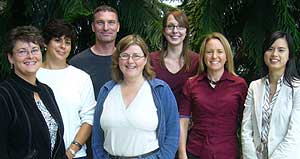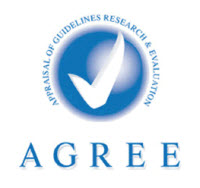Cancer Guidelines: The Capacity Enhancement Program
Enabling quality guideline development
January 12, 2009

The Capacity Enhancement Program of the Cancer Guidelines Action Group is helping boost the development of evidence-based guidelines and their use across Canada.
This initiative is led by Dr. Melissa Brouwers, Director of the Program in Evidence-Based Care at Cancer Care Ontario, and is housed at McMaster University in Hamilton, Ont.
The program is helping people get the skills needed to understand and apply guideline information in a meaningful way. It will:
- create a high-quality and up-to-date database of cancer control guidelines
- build communities of guideline developers and health-care professionals who champion the use of evidence-based decision-making
- foster the sharing of knowledge and best practices and create training opportunities
To meet these targets, the program has fostered relationships with several groups whose goals align closely with the objectives of the project. These include the Department of Clinical Epidemiology and Biostatistics at McMaster University.
“Our goal is to make sure Canadians receive the very best in cancer control. One way to do this is to ensure that the very best cancer guidelines are available to everyone in Canada; but it also goes beyond that.
We want to make sure stakeholders are able to use, understand and value the role that evidence plays in making decisions that are best for their jurisdictions.
By enhancing the capacity across Canada, by raising the bar, we believe we can make a positive impact in cancer control.” – Dr. Melissa Brouwers
An inventory of cancer guidelinesFormal partnerships with evidence-based organizations such as the Canadian Cochrane Network and Centre and the Guidelines International Network are also in place. These relationships will help foster an environment of collaboration and development across organizations and will help the program meet its core objectives:
- a training, education and skills acquisition program
- a cancer evidence casebook
Inventory of cancer guidelines
The inventory of cancer guidelines is an online database of the publicly available clinical practice guidelines in English related to cancer control. People will soon be able to search the database for a guideline on a particular topic as part of a web portal being launched by the Partnership.
 A search for any given treatment topic will likely find many different guidelines. The inventory uses a rating system to help users know which guidelines applied the highest quality development methods and reported the information health professionals need to use them in their practice.
A search for any given treatment topic will likely find many different guidelines. The inventory uses a rating system to help users know which guidelines applied the highest quality development methods and reported the information health professionals need to use them in their practice.
Every guideline in the database is rated by several reviewers using a scoring system called the AGREE II instrument. The reviewers assess the strengths and weaknesses of the reporting of each guideline. They use the AGREE tool to determine a guideline’s score by evaluating:
- how it was developed
- who was involved in its development
- how clearly the recommendations are presented
For a guideline to receive a high AGREE score, there has to be a clear link between the proper collection and use of research evidence by qualified professionals and the development of trustworthy recommendations made in the guideline. The higher the AGREE score, the more confident users can be that the guideline developers used an evidence-based approach to reach their recommendations.
Rating guidelines should help improve the way they are developed. To help their guidelines receive high scores, guideline development teams will strive to develop their guidelines using accepted methods and ensure that the guidelines meet the highest standard.
The database will help reduce the duplication of effort among guideline developers, both across Canada and worldwide. The database also informs the cancer community about what guidelines exist and what areas of focus still need guidelines or updated guidelines.
Most importantly, the database provides access to information that will facilitate evidence-based decision-making by patients, doctors, hospital administrators and governments across Canada.
Training, education and skills acquisition (TESA)
An important component of the project is training and education. This is now available to Canadian health professionals, policy-makers, graduate and post-doctoral students, guideline developers and other stakeholders interested in learning how to use evidence and cancer control guidelines to help them make decisions. Offering education and training tools will also help improve the methods used to make and evaluate guidelines. Improving the quality of cancer guidelines will make evidence-based decisions easier and improve the overall quality of cancer care.
After completing a national needs assessment survey, we are now able to design and execute training events to meet these needs.
The Capacity Enhancement team has also developed an online training tool and score calculator for the AGREE II instrument, making it easier and faster to evaluate guidelines. These tools will be housed in an online training toolbox. The toolbox will offer both new and established resources for those interested in evidence-based decision-making and the development and evaluation of clinical practice guidelines.
Cancer Evidence Casebook
An important program component is the Cancer Evidence Casebook. It will be an online collection of the best Canadian practices that use evidence to guide decision-making. The casebook gives a voice to health-care practitioners and cancer care groups that practice evidence-based medicine, but may not be participating in the development of a guideline. The casebook gives these groups the opportunity to provide feedback, to highlight their work and to draw attention to the use of good practices in evidence-based medicine.
Sharing information helps avoid duplication and the resulting waste of time and resources. Models of care and best practices that work very well for one region of the country may work equally well for another region.
Outcomes
The three elements of the Capacity Enhancement Program are closely linked. Creating an easily accessible and reliable inventory of high-quality, evidence-based practice guidelines will improve decision-making in cancer care. Offering training and building a community of engaged health professionals and guideline developers will improve the quality of newly developed guidelines. Fostering the exchange of knowledge and best practices will advance quality cancer control for all Canadians.
This project is a key initiative of the Cancer Guidelines Action Group as it delivers on its mandate to champion evidence-based practice in cancer control.
